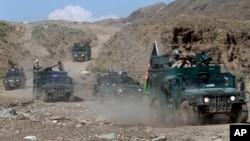Pakistan has temporarily closed one of its two main border crossings with Afghanistan, but said the two sides are in contact with each other to resolve “differences” that prompted the move.
Pakistani authorities began fencing the northwestern Torkhum border crossing on Tuesday to “tighten controls” and deter illegal movement. But the unilateral activity provoked strong resistance from the Afghan side and the tensions forced Pakistan to stop the work and consequently close the border.
Afghan officials say the move has stranded thousands of people on their side, including women and children, mostly intending to travel to Pakistan for medical treatment.
The closure has also halted movement of trucks carrying trading goods, particularly fresh fruits landlocked Afghanistan exports to other countries through Pakistan.
Foreign Ministry Spokesman Mohammad Nafees Zakaria defended the decision, saying the porous border needs to be properly managed to prevent illegal crossings Islamabad believes are posing security challenges for both sides.
“This is in the interest of all concerned to have a well-managed border, a border that has those fences or the check points so that the crossings could be monitored properly,” Zakaria said.
Without elaborating, the Pakistani spokesman said "it so happened that due to some differences over the measures to regulate the movements across the border it has been temporarily closed to avoid any unpleasantness.”
He said Pakistani and Afgahan military officials are in contact with each other, hoping to resolve the issue soon.
Pakistan and Afghanistan share a 2,500-kilometer long porous border with the Torkhum and southwestern Chaman crossings being the only points open for movement of people and trade activities.
About 50,000 people, mostly Afghans use the crossings for daily movement.
Pakistani officials insist their attempts to ensure close monitoring of travelers is to prevent militants from entering the country for subversive acts.
They say the strict controls will also address Afghan allegations that militants retreat to Pakistani border areas after conducting terrorist activities in Afghanistan.
But Kabul opposes these measures because it does not recognize the so-called Durand Line as an international border, and Afghan leaders insist such steps deepen problems for divided families on both sides of the border.




